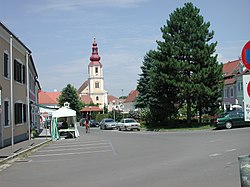Fehring
Fehring | |
|---|---|
 | |
 Coat of arms | |
 Fehring Location within Austria | |
| Coordinates: 46°56′00″N 16°01′00″E / 46.93333°N 16.01667°ECoordinates: 46°56′00″N 16°01′00″E / 46.93333°N 16.01667°E | |
| Country | Austria |
| State | Styria |
| District | Südoststeiermark |
| Government | |
| • Mayor | Johann Winkelmaier (ÖVP) |
| Area | |
| • Total | 87.08 km2 (33.62 sq mi) |
| Elevation | 272 m (892 ft) |
| Population (2018-01-01)[2] | |
| • Total | 7,284 |
| • Density | 84/km2 (220/sq mi) |
| Time zone | UTC+1 (CET) |
| • Summer (DST) | UTC+2 (CEST) |
| Postal code | 8350 |
| Area code | +43 3155 |
| Vehicle registration | FB |
| Website | www.fehring.at |



Fehring is a municipality in the district of Südoststeiermark in Styria, Austria. The landscape is rolling hills cut by the valley of the Raab. Fehring is on a socket some metres above the valley floor. The town is bordered to the east by Burgenland.
Neighbouring municipalities[]
- In the north: Johnsdorf-Brunn and Hohenbrugg-Weinberg
- In the east: Sankt Martin an der Raab and Mühldorf
- In the south: Kapfenstein
- In the west: Pertlstein
Community structure[]
The municipality Fehring consists of the villages Hirtzenrigel, Höflach, Petzelsdorf, Petersdorf and Schiefer.
History[]
The first mention of Fehring is with 40 homesteads in a document from Ottokar of 1265th. The district Petzelsdorf is already mentioned in the Babenberger Urbar 1220th. Fehring was founded as a marketplace and Rudolf IV, Duke of Austria awarded the market law. A parish has been documented in Fehring since 1305.
There have been a lot of wars and fights around Fehring, therefore a tabor was built in the 15th century.
Transportation[]
is the terminus for S3 services from Graz on the .
Coat of arms[]
King Ferdinand granted arms in Augsburg at 8 July 1550.

Twin towns[]
References[]
- ^ "Dauersiedlungsraum der Gemeinden Politischen Bezirke und Bundesländer - Gebietsstand 1.1.2018". Statistics Austria. Retrieved 10 March 2019.
- ^ "Einwohnerzahl 1.1.2018 nach Gemeinden mit Status, Gebietsstand 1.1.2018". Statistics Austria. Retrieved 9 March 2019.
- Cities and towns in Südoststeiermark District
- Styria geography stubs
